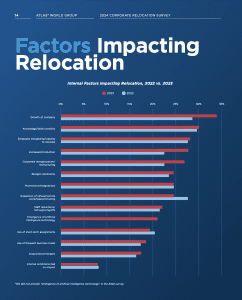
The Ripple Effects of Economic Uncertainty: How Businesses are Navigating Corporate Relocation
With global economic uncertainty on the rise, many businesses are facing difficult decisions about their future. One of the most important considerations for business owners is whether or not to relocate their headquarters and employees elsewhere. As a result of this uncertain economic climate, businesses must carefully weigh the risks and benefits in order to make the best decision for their company.
The current state of the economy
The world economy is facing unprecedented challenges due to the aftermath of the global pandemic. While governments have taken steps to stimulate economic activity and prevent major job losses, uncertainty continues to linger in many cities. Businesses are feeling the effects of this economic instability, particularly when it comes to corporate relocation.
Corporate relocation involves relocating businesses and their operations from one location to another, either domestically or internationally. Companies might relocate for a variety of reasons, such as expanding operations, reducing costs, and taking advantage of new opportunities. In an uncertain economy, however, businesses must weigh the risks and rewards of corporate relocation carefully.
The effects of economic uncertainty on businesses
Economic uncertainty is having a significant impact on businesses, particularly those considering corporate relocation. Economic uncertainty can lead to decreased consumer spending, rising costs, and fluctuations in the stock market, all of which can have a significant effect on businesses bottom line. With lower profits and increased costs, businesses must make tough decisions about how to manage their resources and finances.
Businesses that are considering relocation are especially vulnerable to the effects of economic uncertainty. With such a large undertaking, there are risks and costs associated with relocating a business, and these risks and costs can be amplified during times of economic instability. Businesses may face difficulty finding financing for their relocation and may also find it difficult to attract talent due to the risk and volatility of the situation.
The uncertainty caused by economic instability can also lead to increased competition. As businesses look to relocate, they may find themselves in a situation where they are competing with other companies for the same resources or locations. This competition can lead to higher costs and additional strain on businesses’ finances.
The challenges businesses face when considering a corporate relocation
Relocating a business can be a daunting prospect for any company, but the decision can be especially difficult for businesses in uncertain economic times. While there are numerous benefits to relocating a business, including access to new markets and resources, there are also some considerable challenges that must be taken into account before making such a major move.
First, companies that are considering relocation must take into account the legal, financial, and administrative implications of their decision. This includes understanding and adhering to local laws, regulations, and procedures related to the new jurisdiction. It may also include paying additional taxes or registering the company with a new jurisdiction. Companies must also ensure that they are in compliance with any existing contracts, as well as any other applicable laws and regulations.
In addition to these legal and administrative considerations, businesses must also consider the financial costs associated with relocation. These costs can include real estate and construction costs, moving expenses, employee relocation packages, and other expenses related to setting up operations in a new location. Companies should also consider the potential disruption to existing operations, customers, and other stakeholders during the transition period.
Finally, companies should assess the cultural implications of corporate relocation. Moving to a new location may require businesses to adjust their marketing and branding strategies to meet the needs and preferences of customers in the new market. They will also need to develop an understanding of the local workforce and how their values may affect the company’s policies and practices.
Overall, corporate relocation is not a decision to be made lightly. Companies must carefully weigh all of the potential risks and benefits before making a decision that could have long-term consequences for their business.
The benefits of corporate relocation
Relocating a business can offer numerous advantages, depending on the situation. Lower costs, access to new markets, and better infrastructure are just a few of the benefits businesses can experience from relocating.
Lower costs are one of the primary advantages of relocating a business. When considering the costs associated with staffing, office space, taxes, and utilities, some locations may be more cost-effective than others. Moving to an area with lower costs can help businesses free up resources that can be used elsewhere in the organization.
Access to new markets can be another great benefit. Moving to a new location can provide companies with access to untapped markets that they wouldn’t have had before. This can be especially beneficial for companies looking to expand their customer base or enter into new lines of business.
Finally, relocating a business can provide access to better infrastructure. Improved infrastructure such as better roads, faster internet speeds, and upgraded public transportation can make a big difference for businesses looking to stay competitive. Access to better infrastructure can also help reduce downtime, which is an important consideration for any business.
The risks of corporate relocation
Businesses considering relocating must weigh both the potential rewards and risks of corporate relocation. While relocation may bring cost savings and new opportunities, it can also lead to disruption of operations and a loss of customers. Moving can also be disruptive to employees, as they may need to adjust to new roles and locations. Other risks of corporate relocation include:
1. Political instability: The laws governing businesses in different regions can vary significantly, and political stability is not always guaranteed. As such, businesses may be exposed to a variety of risks when relocating to an area that could become unstable or experience changes in government policies.
2. Financial considerations: Businesses may face additional costs associated with relocation, such as higher taxes, real estate costs, and transportation expenses. There is also a risk that the relocation will not result in increased profits or other financial gains.
3. Cultural differences: Relocation to a new area may bring unfamiliar customs, values, and language barriers that could present challenges for businesses trying to establish themselves in their new environment.
4. Lack of infrastructure: Depending on the region, businesses may find that there is not the adequate infrastructure in place to support their operations. This could include a lack of access to transportation, telecommunications systems, or other resources that businesses rely on to function effectively.
5. Talent pool: Businesses may have difficulty finding the right talent in their new location, which could lead to costly delays in product launches or other operations.
Ultimately, there are a variety of risks associated with corporate relocation that businesses must carefully consider before making the decision to move. While relocation can offer significant benefits, businesses must weigh the risks carefully before deciding to make the move.
The decision-making process for businesses considering a corporate relocation
Businesses must weigh the risks and rewards of corporate relocation when making the decision to relocate. There are a number of factors that must be considered in order to ensure that the move is beneficial for both the company and its employees.
The first step in the decision-making process is assessing the economic climate. Businesses should evaluate the current state of the economy and how it will impact the company’s ability to operate in its new location. Additionally, companies must look at the potential cost savings that could result from relocation and whether or not they can be realized.
The next step is researching the potential new location. Companies should evaluate the tax rates, labor costs, transportation infrastructure, and other local resources available in the new area to ensure that they can support their business goals. It is also important to consider the lifestyle and culture of the new location, as this can have an effect on employee morale and productivity.
Businesses must also consider any legal and regulatory issues that may be associated with relocating, such as complying with different employment laws. This can be a complicated process, and businesses should consult with an attorney to ensure they are in compliance with all applicable laws.
Finally, businesses must plan for the logistics of the relocation. This includes arranging for office space, transportation, and housing for employees. Additionally, businesses must account for any changes in personnel, customer service, marketing strategy, and other areas that may need to be adapted in order to successfully transition to the new location. By taking the time to thoroughly evaluate their options, businesses can make informed decisions about their future and ensure that their relocation is successful.
Enjoy this blog? Please spread the word :)[DISPLAY_ULTIMATE_SOCIAL_ICONS]Top Articles
-
The Top 10 Cities People Have Moving to in 2023
Are you thinking of making a move in 2023? If so, you’re not alone! Every…
-
2023 Corporate Relocation Trend Predictions You Need to Know
The business world is constantly evolving and adapting to new challenges and opportunities. As the…
-
The Ripple Effects of Economic Uncertainty: How Businesses are Navigating Corporate Relocation
With global economic uncertainty on the rise, many businesses are facing difficult decisions about their…
-
When to Offer Lump Sum Relocation Benefits And What to Consider
Relocation is a business necessity to get the right people in the right location. Financial…
-
5 Tips For Choosing a Corporate Relocation Management Company
There are several things to consider when choosing a corporate relocation management company to help…









